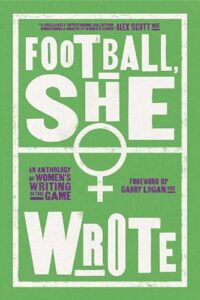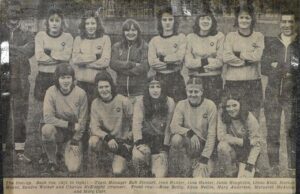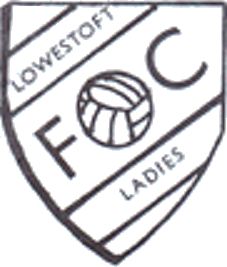Book Review: Football, She Wrote: An Anthology of Women’s Writing on the Game (Part 1)
 As mentioned by Jade Craddock in our two-part interview with the FBR regular writer, Football, She Wrote is a first, indeed unique anthology, in that it brings together 20 pieces of writing by women focusing on their experiences of the most popular team sport in the world – football. The contributions come from 10 experienced writers who were commissioned and 10 new writers who like Jade were chosen after submitting their pieces to a competition, set up by publisher of the book, Floodlit Dreams with the Women in Football organisation.
As mentioned by Jade Craddock in our two-part interview with the FBR regular writer, Football, She Wrote is a first, indeed unique anthology, in that it brings together 20 pieces of writing by women focusing on their experiences of the most popular team sport in the world – football. The contributions come from 10 experienced writers who were commissioned and 10 new writers who like Jade were chosen after submitting their pieces to a competition, set up by publisher of the book, Floodlit Dreams with the Women in Football organisation.
You might ask, ‘why is a female only book required needed in this day and age?’ Well, in the Foreword by Gabby Logan this is eloquently answered: “While there are now so many women working across the industry in front of a camera, as pundits and commentators…women writers still have less visibility and opportunities. So to curate a body of written work, by women, is a milestone that should be marked.”
The great advantage of an anthology is that readers get an introduction to a range of different writers and subjects, providing that exposure and opportunity for women writers that Logan hopes for. However, it is no easy task for contributors, as their pieces have to be short and focused to deliver their message or story.
Overall what can readers expect from this anthology? Stylistically, there are interview pieces, profiles, memories, views and some creative writing with football at their heart and in the process cover topics such as the women’s game, the fan experience, as well as diversity, inclusion and sexuality. Whether you are male or female this is a thought provoking collection, which will challenge readers, but in equal measure stir the emotions.
However to do justice to all the contributors and their piece a short review of each chapter follows. The first ten feature here with the second ten found in Part 2 (to follow).
- Julie Welch – THE GIRLS OF ‘72

A real scene setter and great way to open the anthology with a potted history of the women’s game and how it was banned by The FA in 1921, this despite the significant popularity of teams such as Dick Kerr Ladies at the time. As Welch succinctly details, “the old man in blazers, the medical profession, the anti-suffragists, the patriarchy…won.”
It wasn’t until 1969 that the Women’s Football Association was established, with UEFA’s directive to member countries to recognise women’s football decisive in 1971. With this recognition, the Women’s FA Cup had its first final in 1970/71 and later on Saturday November 18, 1972 at the Ravenscraig Stadium in Greenock, Scotland Women hosted England Women in what was the first official women’s international for both countries. The events leading to that historic match driven by the efforts of Patricia Gregory and Elsie Cook lie at the heart of Welch’s piece.
It is an enlightening story that does make you consider what path the women’s game might have taken if it hadn’t been banned for half a century. Given that, it is a testament to all those down the years like Gregory and Cook and despite that ban, that in November 2019 England played Germany at Wembley in front of 77,768 – a record attendance for an England women’s home fixture.
- Hayley Davinson – MY SEASON-TICKET FRIEND
This piece is amongst the shorter ones within the book, but still packs a telling punch in an observational tale of life as a season-ticket holder. Like this FBR reviewer Davinson is a fellow Fulham supporter, so totally got her references to past players, the Europa League Final run and even the difficulty of getting a pint at half-time in the Hammersmith End!
Davinson’s focus though on how the area you frequent in your regular seat on matchday can lead to a unique type of friendship. It is a story of the shared experience of going to a game, and despite maybe having different political views, being a different age, sexuality or religion, cheering on your team is the one thing that binds you through all the ups and downs supporting your team brings.
- Kate Battersby – THE COOK WHO FOUND THE RIGHT RECIPE
This piece is based around an interview with a quite remarkable woman with an ordinary name – Joyce Cook. Readers discover that Cook overcame an abusive childhood, a battle with her sexuality, and disability to be awarded both a CBE and OBE as well in 2019 FIFA’s first Chief Education and Social Responsibility Officer.
It details how a visit to Old Trafford gave Cook the drive to get out of the depression she felt at being forced into a wheelchair with her disability and was the start of a journey that led ultimately to her role at FIFA. There are some real eye-opening descriptions of the awful conditions disabled fans have had to endure down the years even at major tournaments.
Battersby does a great job in telling the story of a women acknowledged as “one of the world’s leading voices on inclusion, anti-discrimination, and sustainable development in sport and wider society.”
- Kehinde Adeogun – TWO BLACK ROOKIES AND A MICROPHONE

Part of this anthology’s strength is its ability to challenge, stir emotion, create debate and make us laugh and indeed on occasions cry. Kehinde Adeogun’s tale is one that falls into the category of making readers smile. This piece tells of football fans Kehinde and sister Taiwo, who through their love of the game come to report on the FIFA 2007 Women’s World Cup in China for BBC World Service and its African sports programme, Fast Track.
With only a short course in radio journalism under their belts, and armed with a audio recorder, a copy of Lonely Planet: China, and no understanding of Mandarin, these two resourceful women set about providing both live and recorded content for the programme from the tournament.
What is evident through the writing is the joy and sheer enjoyment that their adventure brought them, and this translates to the reader. There are some memorable tales included as the women seek to order food at their hotel purely through sign language and on another occasion they are followed around late night supermarkets with the locals unused to seeing black people. However, this is not to detract from the fact that they carried out their role as required getting the interviews and content as required, which included an interview with now men’s Brighton manager but then technical director for the Ghana women’s team, Graham Potter. It’s a great advocate of the old adage, ‘you don’t get, if you don’t ask.’
- Suzanne Wrack – ESTATE OF MIND: THE MAKING OF EMMA HAYES
It’s quite an achievement to find out about a person without interviewing them, but this is what Suzanne Wrack achieves in this piece devoted to Chelsea Women’s manager Emma Hayes. Instead readers get to understand what makes the successful Hayes tick through Wrack’s interviews with her relatives and others within the game, as well as a look at her council estate upbringing – a childhood that Wrack herself experienced, and one that she likes to point out is not always about the cliqued view of concrete, poverty and negativity.
Against this background, we learn of how Hayes’ career was ended through a skiing accident, but that this only drove her on to earn coaching badges in various sports before travelling to the USA, the country most highly regarding in terms of football in the women’s game at the time and to this day. Back in the UK her quality as a coach took her to Arsenal working as an assistant, helping them to win 11 major trophies in a three-season spell. She moved to Chelsea in 2012 bringing the club nothing but success.
Emma Hayes is undoubtedly a winner but is founded on a deep determination to always strive to be the best, combined with creating a positive and trusting environment.
- Cassie Whittell – ANFIELD OF DREAMS
This piece is written in a diary format, relaying significant football related memories starting with the seven-year old Whittell at primary school in 1978, through to 2019 where as an adult she is working within football. The journey has various stops in 1980, 1986, 1987, 1990, 1993, 1994, 2000, 2004, 2010 and 2017 as Whittell explores the high and lows of being a female looking to get her football fix whether as a player or spectator.
Whittell opens with her picking of Liverpool as her team back in ’78 and the excitement of being “part of Kenny Daglish’s gang.” That joy is dashed two years later when facing prejudice at school as hopes of entering the school five-a-side competition with an all-girl squad is rebuffed with the master in charge urging them to, ”Go and ask Miss Simpkins to put on a netball tournament for you instead.” The experience is no better in 1986 as England play Argentina in the World Cup, and as Maradona scores with the ‘Hand of God’ goal, Whittell is led out of the room by her aunt, saying, “it’s not for you love…leave the men to it.”
By the next World Cup in Italy, Whittell is obviously alone amongst her mates in seeing the beauty of the game epitomised by David Platt’s late goal against Belgium. However, the tide begins to turn in 1993 when Whittell attends her first game as Sheffield United host an Alan Shearer inspired Blackburn Rovers an experience she openly admits she loved and couldn’t wait to repeat. A year later Whittell goes to a game on her own and it was exhilarating to read how it made her feel – “Just me, raw and bold, whooping when Rotherham score, groaning when they conceded. I can feel free.”
The positivity continues when in 2000, in her work environment when Whittell’s football knowledge is acknowledged, however, is it tempered by sexist comments – the dawn of a new millennium, but no change in old attitudes. Skip forward four years and Whittell is visiting Old Trafford on Boxing Day imbibed not only with Festive spirit but the Liverpool view of their northwest neighbours, “the awful and detestable Manchester United”. Then in 2010, Whittell attends Anfield the home of the team she choose to follow back in 1978 for the first time. It was a joy to read of how overwhelming the experience was, and how it gave voice to release all her football frustrations. The final two entries for 2017 and 2019 see Whittell move first into a volunteer role and then into a full-time role within the game.
The piece is a wonderful journey, which illustrates how Whittell has fought to find her place in the game which since that playground choice in 1978 she has loved her whole life.
- Molly Hudson – WINNING AND LOSING
This is an incredibly personal piece from Molly Hudson looking at the career of Fran Kirby and also Hudson’s own journalistic journey. The one thing connecting the two women besides their success within their respective fields within football, is the emotional impact of the loss of their respective mothers.
Kirby started at Reading at the age of seven any by sixteen had made her senior debut. The death though of her mother Denise when Kirby was just fourteen deeply affected the young player. Kirby suffered with depression and walked away from the game. However, she returned in 2012 after her love for the game was rekindled after playing in a Sunday amateur league. Fulfilling the potential her mother always knew her daughter had, Kirby helped Reading to promotion and by 2014 had made her full England debut and then playing in the 2015 World Cup. It was a big year in that she also moved to Chelsea and has seen her pick up many trophies as The Blues have become a major force in the women’s game.
Hudson began writing for The Times in 2017 and has since covered the Premier League, Champions League and women’s World Cup. She covered the 2019 women’s World Cup against the backdrop of her mother’s terminal illness diagnosis, with work a distraction against the reality of the situation.
It is an inspiring piece and one which sheds some light on the grieving process and shows that as well as their outstanding talent both Kirby and Hudson have strength and courage in telling their respective stories.
- Ali Rampling – HIGHS AND LOWESTOFT
 If you look at the recent winners of the women’s FA Cup over the last ten years, the current powerhouses are those of Arsenal, Chelsea and Manchester City. Go back to the ‘70s and it was Southampton and in the ‘80s it was the Doncaster Belles. Tucked away amongst the names of the finalists of that period are the Lowestoft Ladies who were runners-up to Southampton in 1978/79, and who would lift the trophy three seasons later in 1981/82.
If you look at the recent winners of the women’s FA Cup over the last ten years, the current powerhouses are those of Arsenal, Chelsea and Manchester City. Go back to the ‘70s and it was Southampton and in the ‘80s it was the Doncaster Belles. Tucked away amongst the names of the finalists of that period are the Lowestoft Ladies who were runners-up to Southampton in 1978/79, and who would lift the trophy three seasons later in 1981/82.
Ali Rampling lifts the lid on the Suffolk club founded in 1971, and who just 12 months after their win over Cleveland Spartans (now Middlesbrough Women FC) at QPR’s Loftus Road, folded. In this interesting piece, Rampling interviews former players and management in discovering the success the club achieved, with many players featuring for England such as Debbie Bampton and Linda Curl. They totally dominated local football, winning the East Anglian League in 1972/73, 1973/74 and 1974/75 and continued their winning ways in the South East of England League as Champions in 1975/76, 1976/77, 1977/78 and 1978/79.
Despite all that success, there is the feeling that the club was let down by the football authorities, with Lowestoft, left without a division to play in after the South East of England League folded. The club’s applications to five other leagues were rejected due to their geographical location with the offer of a return to the East Anglian League not taken up, given that Lowestoft would have overwhelmed the teams at that level. With all their best players leaving, the club exited the FA Cup 7-0 just twelve months after lifting the trophy and folded at the end of the 1982/83 season.
- Isabelle Barker – TAKE THREE WOMEN…
This piece from Isabelle Latifa Barker, the first winner of the Vikki Orvice Scholarship and with it a two-year contract to work on the sports desk of The Sun, is a tribute to three women who have been role models for women aspiring to work within sports media and journalism.
Firstly, there is Vikki Orvice, wife of Ian Ridley, who sadly died in 2019, but was such a driving force and trailblazer as the first woman staff football writer for a tabloid, working at The Sun in 1995, as well as a founder and board member of Women in Football and vice-chair of the Football Writers’ Association (FWA). Secondly, Carrie Brown, the first female chair of the FWA, and presenter/reporter who has worked for the likes of Eurosport, Al Jazeera and BeIN Media and lastly Jacqui Oakley who has worked on major events for BBC, ITV, Sky Sports and various other media outlets.
The fitting tribute in highlighting the significance of the three is to be found in the closing paragraph of this piece. Of Brown, Barker praises her as she has “continued to break ground, always ensuring youngsters…have a supportive network of women to go to.” Whilst Oakley “has balanced the demands of motherhood with her high-stakes efforts to give confidence and advice to new mums in the industry”, with Orvice, “a fantastic mentor for many young female writers.” And as a trio, Barker acknowledges, “it’s thanks to these pioneers that we will be seeing more women in press boxes, newsrooms, in front of cameras an behind microphones up and down the country.”
- Katie Mishner – WHAT IT COULD BE LIKE
 Ever been to watch you team but not felt part of it? Well this is exactly what Katie Mishner explores in this piece about her experiences as a member of the LGBTQ+ community.
Ever been to watch you team but not felt part of it? Well this is exactly what Katie Mishner explores in this piece about her experiences as a member of the LGBTQ+ community.
Mishner opens with her watching her beloved Newcastle United away at Blackburn Rovers, which is full of the usual passion and togetherness you experience as an away fan especially when you are 2-0 up after twenty-minutes. However, all this changes when one of the Toon fans screams a homophobic insult at a Rover player. Suddenly that feeling being part of something was deeply fractured and when a similar instance occurred at Hillsborough not long after, Mishner seriously questions whether there has been progress in the game in stamping out homophobia.
Her points are indeed valid when looking at the statistics Mishner provides, in addition to her pointing out the rise in vile vitriol that still pervades social media not just in the arena of football, but in society in general. And what of FIFA? What were they thinking in awarding the 2018 World Cup to Russia, a country “prolific in its persecution and violence towards this community (LGBTQ+) and Qatar in 2022, where “homosexuality is criminalised…and punishable by a prison sentence.”
However, against that Mishner offers hope in recognising the various bodies looking to make a stand, such as, Gay Football Supporters Network, Kick It Out, Pride in Football and Football v Homophobia. And out of that last initiative (Football v Homophobia) Mishner experiences what a game can be like as she and her partner attend a game at Altrincham where the club wears rainbow jerseys and in an environment and atmosphere where they simply were able to just enjoy the game. The hope is that going forward there will be less days like that experienced at Ewood Park and more days like that at Altrincham. Football is for everyone.